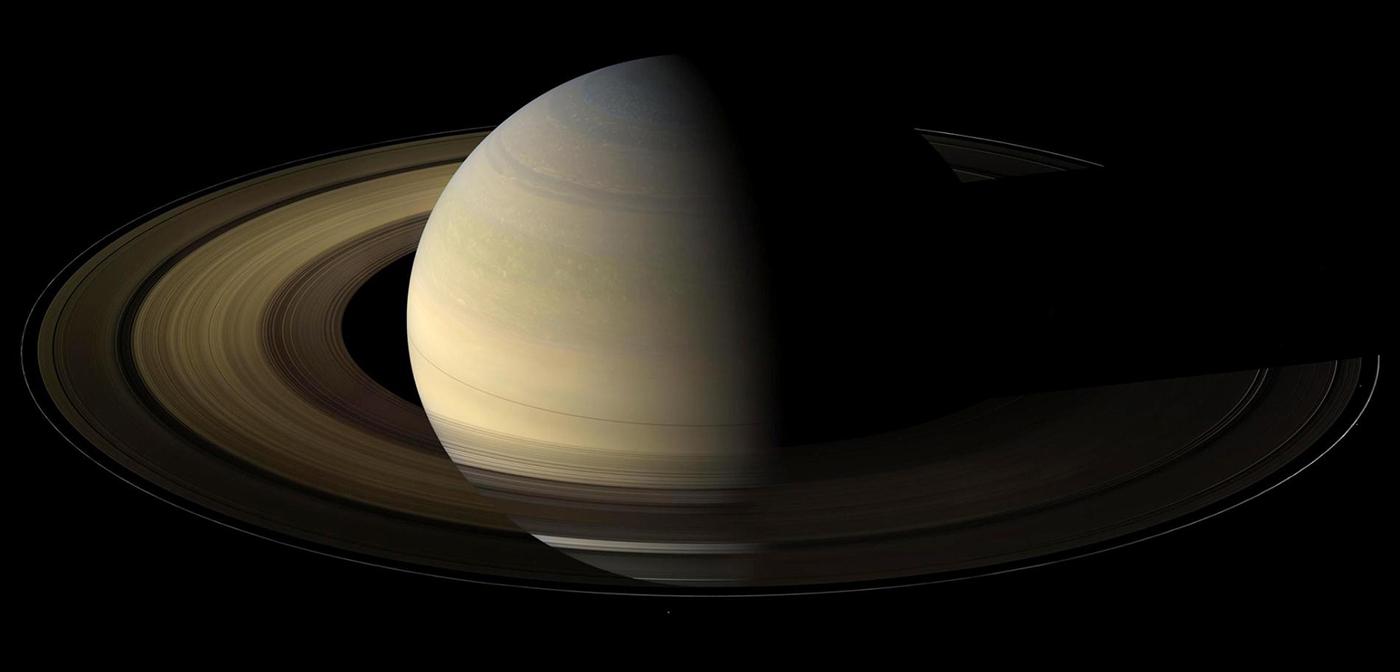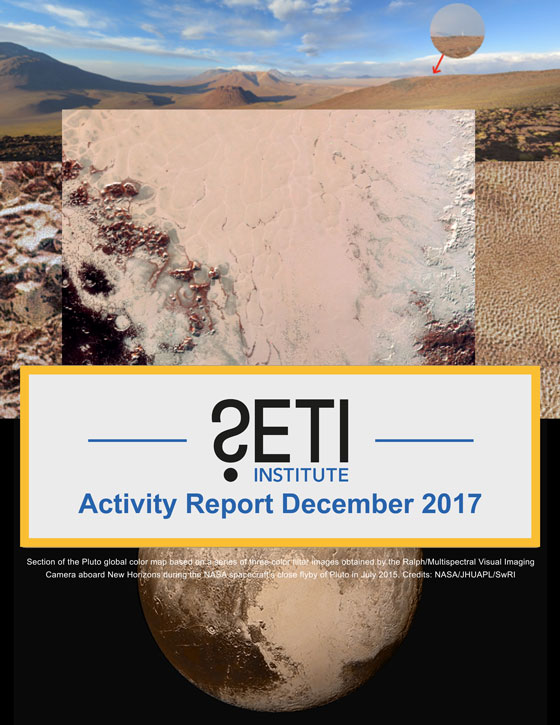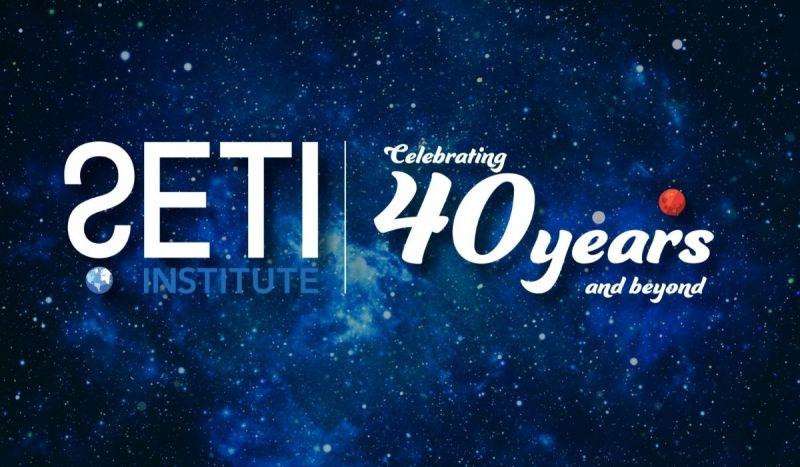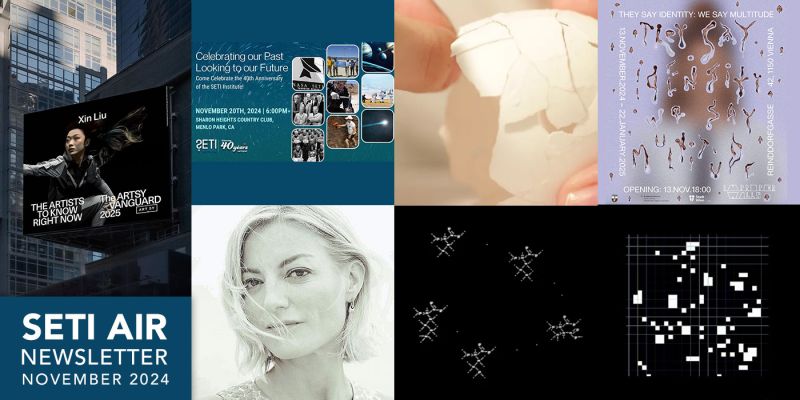
SETI Institute scientist Pascal Lee presented new findings from NASA’s Lunar Reconnaissance Orbiter (LRO) at NASA Ames last week. Small pits in a large crater near the North Pole of the Moon were discovered and they may be entrances to an underground network of lava tubes. What makes this discovery compelling is that if there is water ice present, these lava tubes could make it easier for future explorers to access water on the moon.
“Our next step should be further exploration, to verify whether these pits are truly lava tube skylights, and if they are, whether the lava tubes actually contain ice. This is an exciting possibility that a new generation of caving astronauts or robotic spelunkers could help address” says Lee. “Exploring lava tubes on the Moon will also prepare us for the exploration of lava tubes on Mars. There, we will face the prospect of expanding our search for life into the deeper underground of Mars where we might find environments that are warmer, wetter, and more sheltered than at the surface.”
- SETI.org: Possible Lava Tube Skylights Discovered Near the North Pole of the Moon
- Newsweek: NASA Finds Lava Tubes Near Moon’s North Pole That May Be Passageways to Hidden Water
- C/Net: ‘Lava tube skylights’ on the moon call to caving astronauts
- Seeker: Ice from Underground Lava Tubes Offers Possible Water Supply for Moon Missions
- Science Alert: Scientists Think They’ve Discovered Lava Tubes Leading to the Moon’s Polar Ice
- Phys.org: Possible lava tube skylights discovered near the North Pole of the Moon
- International Business Times: Moon Caves at Lunar North Pole Might Lead Astronauts Directly to Water
- BGR: Astronomers just spotted bizarre holes on the Moon that might reveal hidden tunnels
- Science Springs: From SETI Institute: “Possible Lava Tube Skylights Discovered Near the North Pole of the Moon
- RT: Moon pits may be ‘skylight’ to underground lunar ice – but why is that important?
- Skymania: NASA finds possible lava tubes that could support lunar colonies
- Blasting News: Possible lava tubes near the moon’s North Pole
- Next Big Future: SETI Institute finds lunar lava tubes that could provide easy access to water ice
Saturn is known to even the most casual astronomical observer by its distinctive rings. Now, based on observations from Cassini, researchers are suggesting that the rings have not always been there and may, in fact, be relatively young, formed possibly 100-200 million years ago, during the age of the dinosaurs. SETI Institute scientist Matija Cuk noted in an interview with National Geographic:
“Even with the unaided eye, Saturn would be as bright as Venus and would be noticeably elongated,” says Matija Cuk of the SETI Institute. “If the dinosaurs had birdlike vision, they would definitely be able to see it. Not clear they would care, though.” (National Geographic)
The research will continue to confirm or refute these conjectures.
- National Geographic: Ringless Saturn? The Planet’s Famous Feature May Be Surprisingly Young.
There’s a push towards getting a manned mission to Mars sooner than previously thought possible. This has stimulated conversation in the scientific community about how to go about protecting Mars from contamination from terrestrial microbes and vice versa. After all, if we were to discover life on Mars, we really wouldn’t want it to be the life that we brought there from Earth. As SETI Institute scientist John Rummel notes:
“If we send Earth organisms to a place where they can grow and thrive, then we might come back and find nothing but Earth organisms, even though there were Mars organisms there before,” says Rummel. “That’s bad for science; it’s bad for the Martians. We’d be real sad about that.” (Science News)
Understanding just how extreme the climate needs to be before it’s impossible for even Earthly extremophiles to survive has been the work of several SETI Institute scientists, including Pascal Lee, whose fieldwork is conducted in the Arctic. Part of that research has included collecting samples from pristine snow, dirty snow behind his vehicle, and from inside the rover’s interior, and sending those samples for analysis. This has indicated that if human vehicles drive over a microbe-free surface in such an environment, they will not contaminate it.
A new show called Offworld is exploring the intersection of space and pop culture. Each episode looks at a science fiction story and puts it the scientific test. In the first episode, they consider the film Contact with guest Jill Tarter. Jill is one of the co-founders of the SETI Institute, is the Bernard M. Oliver Chair for SETI at the SETI Institute, and is the inspiration for Jodie Foster’s character, Ellie Arroway, in the film Contact.
- Adam Savage’s Tested: Offworld Episode One: Contact with Jill Tarter

Even during the busy holiday season, the work of the SETI Institute pushed forward. Scientists and researchers published in peer-reviewed journals, presented at scientific conferences and other professional events, and marked milestones in their research. In addition, they worked hard to share their learning with the public, through articles and interviews with the popular press, through pubic talks, and through the SETI Institute’s website, social media channels, and our radio show and podcast, Big Picture Science.
Download the whole December 2017 activity report.
Last week’s Are Animals Really That Smart? wondered, amongst other things, whether people own cats or the other way around. This week, the encore presentation of Geology is Destiny reads Earth’s history in rocks.
Last week SETI Institute President and CEO Bill Diamond was at the AAS in Washington D.C. and spent some time with SETI Institute scientist Jeff Coughlin discussing his work on Kepler/K2. He was also joined by Lucianne Walkcowicz, the newest member of the SETI Institute’s Science Advisory Board and an astronomer based at the Adler Planetarium.
All past Facebook Live videos can be seen on the SETI Institute’s Facebook page at https://www.facebook.com/SETIInstitute/.
- SETI Talks: January 23, Menlo Park, CA SETI Institute Researcher Matija Cuk and Meg Scwamb of the Gemini Observatory in Hawai’i will discuss ‘Oumuamua
- Tech Summit: January 23, San Mateo, CA Seth Shostak to participate in a panel discussion about the Fermi Paradox
- Silicon Valley Astronomy Lecture Series, January 24, Los Altos, CA: Cosmic Gold: Neutron Star Mergers, Gravitational Waves, and the Origin of the Heavy Elements with Eliot Auataert, sponsored in part by the SETI Institute
- Rencontre du Vietnam on Exoplanetary Science: February 25 – March 2, Quy Nohn, Vietnam, Franck Marchis will present
- Osher Life Long Learning Institute: March 2, Berkeley Institute Seth Shostak and Margaret Race to discuss Big Trends in Astronomy
- California Academy of Sciences: April 12, 2018, Seth Shostak to participate in the monthly Nightlife talk
- Palo Alto Jewish Community Center, May 2, Palo Alto, CA Seth Shostak to offer SETI Talk presentation
- Association of Computer Professionals in Education: May 4, Welches OR Seth Shostak to participate in annual conference
- The Villages: May 8, San Jose, CA Seth Shostak to offer talk about SETI





